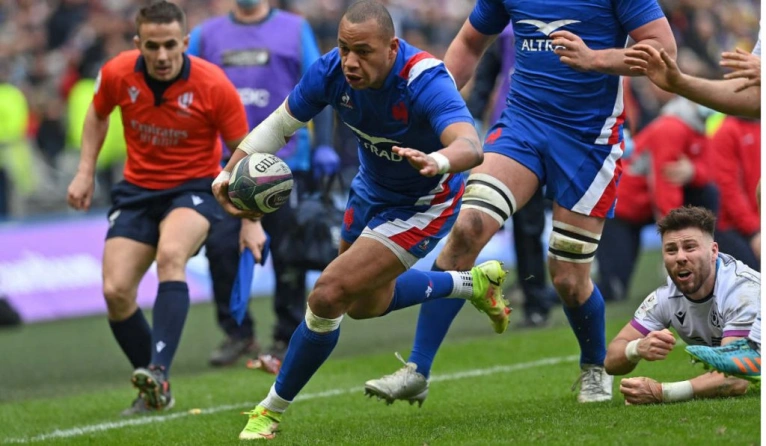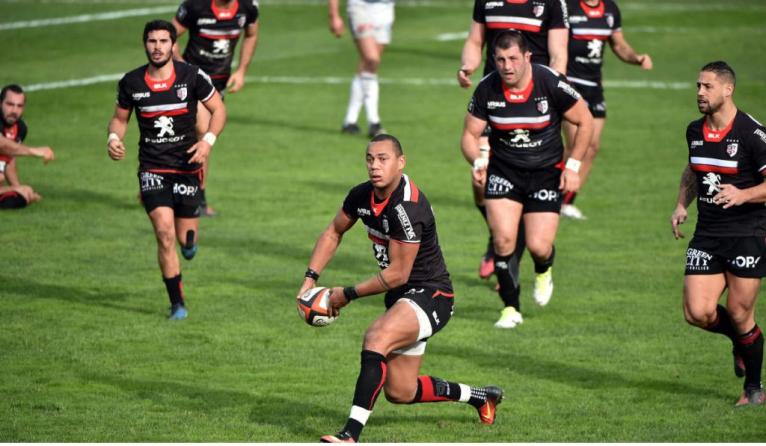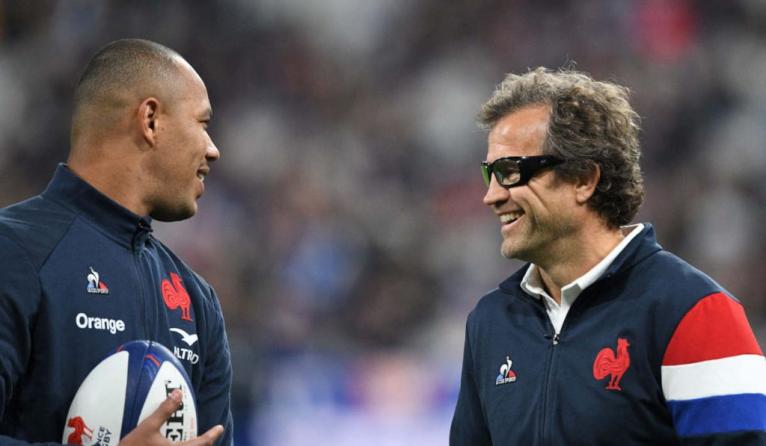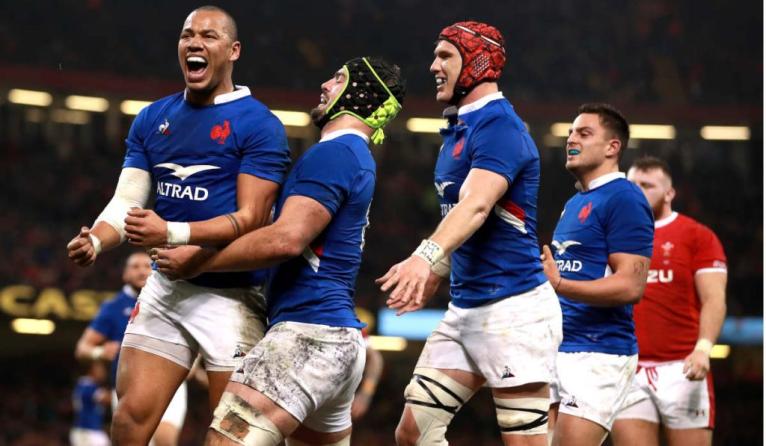Almost exactly ten years ago, in April 2012, Shaun Edwards wrote a column for The Guardian in which he said he ‘had seen the future and it runs, tackles, scores tries’. The then Wales defence coach was talking about a youngster he had watched in action during the recent Under-18 world championship in Madrid. His name was Gaël Fickou, recently turned 18, described by Edwards as ‘a cross between a young Damien Traille and Wesley Fofana’. Edwards then made a prediction: ‘Fickou will play for France sooner rather than later and it’s not too much of a mind-stretch to see him lining up alongside Jonny Wilkinson – assuming Toulon continue as they are currently progressing in the Top 14 – when next season’s Heineken kicks off in the autumn.’
Fickou never did line up alongside Wilkinson; he moved from Toulon to Toulouse in the summer of 2012, and instead found himself in a squad containing the likes of Thierry Dusautoir, Yannick Jauzion and Vincent Clerc. Within weeks of joining Toulouse he had established himself in the starting XV, and in October 2012 Fickou made his Heineken Cup debut against Leicester Tigers. The teenager centre was a sensation, scoring a superb individual try in a thumping Toulouse victory. ‘Rugby’s next global superstar’, shrilled one British paper.
Fickou won his first cap in that season’s Six Nations, as a substitute in the win against Scotland, and in the 2014 championship he scored his first try – a late match-winning effort that saw off the English. The French press went wild. One paper, Le Figaro, called him ‘a phenomenon…the new [Philippe] Sella’, much to Fickou’s discomfort. ‘I’m not a star,’ he pleaded. ‘The hardest is to come. Nobody was expecting me to score. Now everybody will be waiting for me to repeat it.’

It would be a long wait. Fickou had the misfortune to suffer from the inadequacies of two coaches: Guy Noves at Toulouse and Philippe Saint-André, in charge of the national team from 2012 to 2015. The latter had worked briefly with Fickou at Toulon but when he took over the Bleus his limitations were exposed. He didn’t seem to know what style of rugby best suited France, and this uncertainty was reflected in his muddled team selection. Saint-André went through more than 75 players in his four seasons in charge, and such a high turnover does nothing for a team’s confidence and stability, particularly for a callow youth such as Fickou.
It didn’t help that at the same time Toulouse were in sharp decline. Noves had outstayed his welcome, a fine coach in his heyday but one who had failed to move with the times. He was jaded, Toulouse were jaded and Fickou suffered as a consequence.
Fickou was a peripheral figure during the 2015 RWC. Perhaps that was a blessing in disguise. France were awful throughout that tournament, a team without shape or spirit
He lost form, winning only one cap between March 2014 and March 2015, and then he sustained a serious knee injury that meant he was a peripheral figure during the 2015 RWC. Perhaps that was a blessing in disguise. France were awful throughout that tournament, a team without shape or spirit.
But who should then replace Saint-Andre as national coach? None other than Noves. It was an appointment that condemned France to another four-year cycle of stagnation. And also Fickou. In desperation he left Toulouse in 2018 for Stade Français.
When I interviewed Fickou in 2020 he explained why he made the move. ‘I grew up at Toulouse, it’s where I won my first cap, and I’ll always have a deep affection and respect for the club,’ he said. ‘But I’d reached a point where I felt I needed a new challenge and I’ve found that at Stade Français. I haven’t won anything yet with the club but they’ve allowed me to grow further as a player and assume more responsibility.’

Six months after that interview, in April 2021, Fickou had upped sticks again, a shorter move this time, across the capital from Stade Français to Racing 92. Stade felt betrayed. Their president, Hans-Peter Wild told L’Equipe that ‘I’m not angry, I’m disappointed, disappointed by his state of mind…it’s just not done to abandon your teammates during the season. The club needed him to try and finish in the top six [of the Top 14].’
It was a move that didn’t reflect well on Racing or Fickou, and it mocked what he had told me about life at Stade under coach Gonzalo Quesada. ‘Gonzalo has the human touch,’ he explained. ‘He’s close to the players and there’s a good spirit building in the club.’
I see the comments on social media saying my move to Racing was shameful but today a player needs to know what his future will be. He needs clarity for his family, his projects, his ambitions.
Gaël Fickou
When Fickou revealed his reason for leaving he was as honest as he was hard-headed. ‘Rugby’s evolved,’ he said. ‘I see the comments on social media saying it’s shameful but today a player needs to know what his future will be. He plays for a club, he likes the club but he needs clarity for his family, his projects, his ambitions. The [rugby] mindset must evolve. Transfers are part of the future.’
Fickou is right, of course. His timing in leaving Stade may have been poor but his reason was not. The career of a professional rugby player is short; why shouldn’t they cash in while they can?
But there was more to Fickou’s move to Racing 92 than just money. Not only was the pay cheque bigger but so was the responsibility. Within weeks he was captaining the side in the absence of Henry Chavancy, a role in which he has thrived. ‘I had talked about it with the coach (Laurent Travers],’ he said at the time. ‘He believes in me, he has confidence and that’s nice, all the more so as I feel really good here.’

In other interviews that Fickou has given there are clues to suggest that perhaps someone advised him that a move to Racing might give his career some impetus. Someone, say, like Fabien Galthié. When we spoke in 2020 Fickou was effusive in his praise of the then new head coach of the Bleus. ‘He’s very demanding,’ he told me. ‘But we have a good relationship; we talk regularly and he’s already brought a greater precision to my game. He really knows his rugby and you can see how our attacking game has improved. I think his appointment is very good for France.’
I’m expecting him to be a leader of men, like Jonathan Davies and Jamie Roberts with Wales. I’m sure that he’s going to become a great defence captain.
Shaun Edwards
Galthié is not a man who beats about the bush. Nor does Laurent Labit, the backs coach of France, a role that he performed for Racing 92 from 2013 to 2019. One can imagine the pair telling Fickou more or less what he told an interviewer last October. ‘I think it’s time that I take on more responsibility and try to help the team.’
Galthié has given him that responsibility since he was appointed head coach in 2019. Eleven of Fickou’s first 20 caps came from the bench but he has started all of his thirteen caps won under Galthié. But arguably no one has done more to bring Fickou out of his shell than Shaun Edwards, the man who recognised his precocious talent in 2012. France’s defence coach since 2020, Edwards first move was to make Fickou his defensive captain. ‘I’m expecting him to be a leader of men, like Jonathan Davies and Jamie Roberts with Wales,’ said Edwards on explaining his decision. ‘I’m sure that he’s going to become a great defence captain.’

Edwards isn’t just a superb coach, he’s also a shrewd judge of character, not to mention an astute talent spotter. He’s had his eye on Fickou for a decade and since he’s got his hands on him in 2020 he has withGalthié’s help ironed out the flaws and fine-tuned his strengths.
The Frenchman, for his part, recognises what the Englishman has done for his game. ‘We’ve progressed a lot with Shaun Edwards, who is an excellent coach,’ Fickou told Midi Olympique last week. ‘He’s helped us evolve enormously…defensively, we must continue with the same mindset.’
That’s the Edwards’ mindset, the one England lack, the one France have, and the main reason why Gaël Fickou has now become the player that Edwards predicted in 2012.


Comments
Join free and tell us what you really think!
Sign up for free